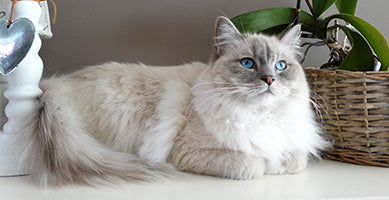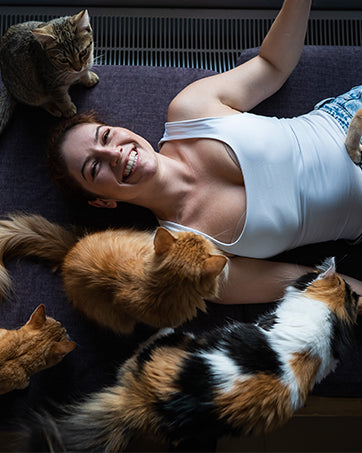Jessica W. Kelvin - Mar.05.2024
Why Do Cats Eat Grass?
7 Insights into Feline Behavior

Written by Vinh Trinh| DVM|4.9.24
What Is Inflammatory Bowel Disease In Cats?
Est. read time: 5 min.
FFeline inflammatory bowel disease (IBD) is a challenging condition that affects many cats worldwide. It involves chronic inflammation of the intestines and can significantly impact a cat's quality of life. Recognizing the symptoms early can make a substantial difference in managing this disease effectively. This blog aims to shed light on what feline IBD is, its causes, symptoms, and treatment options to help cat owners better understand how to care for their furry friends.
What is Feline Inflammatory Bowel Disease?
Feline Inflammatory Bowel Disease (IBD) is a group of gastrointestinal disorders primarily characterized by chronic inflammation of the intestines. It is not a single disease but a syndrome that encompasses various forms of chronic enteritis. In cats with IBD, inflammatory cells infiltrate the walls of the gastrointestinal tract, leading to thickening of the walls and disrupting the intestine's ability to function properly. The cause of IBD in cats is often multifactorial, involving genetic predispositions, immune system abnormalities, and potentially, allergens in the diet.
Causes of Feline IBD
The exact causes of feline IBD are not well understood, but several factors are believed to contribute to the development of this condition:
Genetic Predisposition: Some cat breeds appear more susceptible to IBD, suggesting a genetic component.
Environmental Factors and Diet: Exposure to certain environmental triggers or dietary allergens can exacerbate the condition. Foods that are high in fat or use poor-quality meat products can sometimes trigger an inflammatory response.
Other Contributing Factors: Chronic stress, concurrent infections, and imbalances in intestinal bacteria may also play roles in the onset and progression of IBD.
Symptoms of Feline IBD
Feline IBD can manifest a variety of symptoms, which may vary in severity depending on the individual cat and the extent of the intestinal inflammation:
Common Symptoms: The most noticeable signs of IBD in cats include chronic vomiting, diarrhea, and weight loss. The stool may also appear greasy and more odorous than usual.
Less Common Symptoms: Some cats may exhibit additional symptoms such as lethargy, decreased appetite, and occasional fever.
When to Consult a Vet: It’s crucial for cat owners to consult a veterinarian if they notice any of these symptoms persisting. Early diagnosis and treatment can prevent complications and improve quality of life.
Diagnosis and Treatment
Diagnosing feline IBD typically involves a combination of clinical evaluation and specific diagnostic tests:
Diagnostic Processes:
Blood Tests: To check for signs of inflammation and rule out other diseases.
Imaging: X-rays or ultrasound may be used to look at the structure of the gastrointestinal tract.
Biopsy: The definitive diagnosis of IBD requires a biopsy of the intestine, taken during an endoscopy or exploratory surgery, to evaluate the type and extent of the inflammation.
Overview of Treatment Options:
Dietary Management: Switching to hypoallergenic or novel protein diets can significantly help manage symptoms.
Medication: Anti-inflammatory drugs such as corticosteroids are commonly used, along with other medications that modulate the immune system.
Probiotics and Supplements: These can help restore intestinal flora balance and support digestion.
Importance of a Tailored Treatment Plan: Each cat's response to treatment may vary, necessitating adjustments in therapy to find the most effective approach.

Managing a Cat with IBD
Living with a cat with IBD requires ongoing care and attention to manage the condition effectively:
Daily Care Tips: Feeding small, frequent meals can help alleviate gastrointestinal stress. Maintaining a stress-free environment is also critical.
Importance of Ongoing Veterinary Care: Regular check-ups with the vet are essential to monitor the cat’s health and adjust treatment as necessary. This proactive approach helps manage the disease long-term and maintain a good quality of life for the cat.
Conclusion
Feline inflammatory bowel disease is a complex condition, but with the right knowledge and care, it can be managed effectively. Recognizing the signs early and consulting with a veterinarian are crucial steps in caring for a cat with IBD. If you suspect your cat might be suffering from this condition, do not hesitate to seek professional advice to ensure your pet remains healthy and happy.
Cats:Theobromine Toxic Consumption
Most Cats: 1-10 lbs(0.45-4.6 kg), Large Cats11-25 lbs(5-11.4 kg)
Cacao Beans: Most Cats> 0.05 oz, Large Cats> 0.5 0z
Unsweetened Baking Chocolate: Most Cats> 0.2 oz, Large Cats>2 0z
Dark Chocolate: Most Cats> 0.5 0z, Large Cats>7 oz
Milk Chocolate: Most Cats>1.5 0z, Large Cats>16.5 0Z
White Chocolate: Most Cats>360 oz, Large Cats>4000 0z
Cocoa Powder: Most Cats> 01 0z, Large Cats>10z
Cocoa Bean Mulch: Most Cats>0.1 0z, Large Cats>1 0z
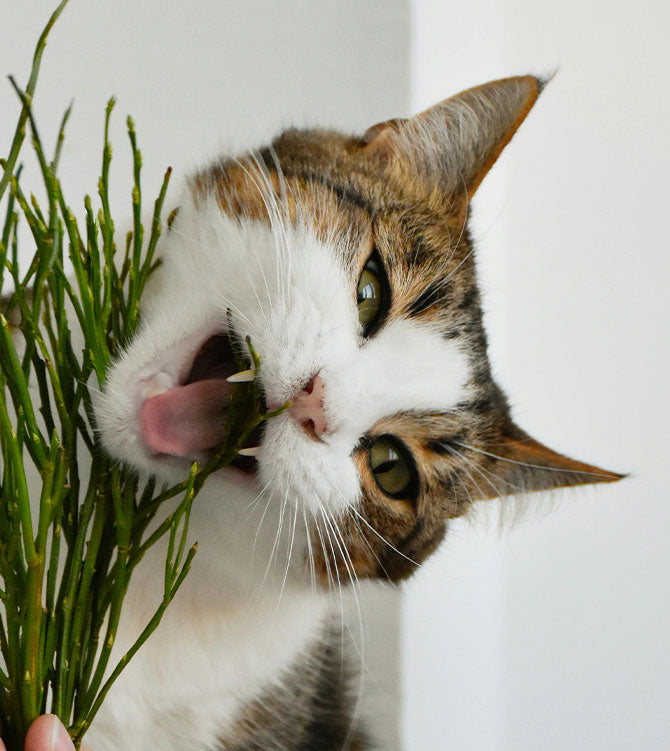
Showing making procedure is a good way to guarantee product quality
Stress Relief
Eating grass can also serve as a form of stress relief for cats, providing a calming activity that distracts from anxiety or boredom.
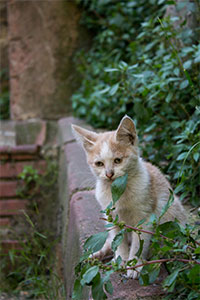
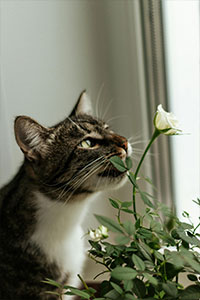
Get customer attention by clean visual and video
Instinctual Actions
Grass eating is an instinctual behavior that may stem from a cat's need to seek out alternative food sources or to induce vomiting to clear their stomachs of indigestible materials.
Article credit: Heidi Cohen (https://heidicohen.com/use-blog-to-sell/)
Digestive Aid
Grass acts as a natural laxative, helping cats pass hairballs or other indigestible items through their digestive tract more easily.
Elimination of Parasites
It's also theorized that grass eating may help cats eliminate intestinal parasites, although this benefit is more anecdotal than scientifically proven.
How to Safely Introduce Grass to Your Cat
Suitable Types of Grass
Certain types of grass are more beneficial and safer for cats, including wheatgrass, which is often sold as "cat grass."
Growing Your Own Cat
Grass
For the safety and health of your cat, consider growing your own cat grass at home. It's a simple and effective way to ensure they're getting a safe product.
Alternative Behaviors and Solutions
Dietary Supplements
If your cat shows an excessive interest in eating grass, it might indicate a dietary deficiency. Consult with a veterinarian about supplementing your cat's diet.
Behavioral Enrichment
Providing toys, climbing structures, and engaging activities can reduce your cat's inclination to eat grass by offering alternative forms of stimulation.
Why Do Cats Eat Grass?
Exploring the curiosity behind this behavior reveals a complex blend of nutritional, psychological, and instinctual factors. Understanding these can help cat owners provide better care and enrichment for their feline friends.
Owner Experiences and Advice
Personal Anecdotes
Many cat owners have observed their pets eating grass and have noted the benefits or concerns that came with it. Sharing these experiences can offer valuable insights for other pet owners.
Expert Recommendations
Veterinarians and animal behaviorists can provide professional advice on managing grass-eating behavior, ensuring it remains a safe and positive experience for your cat.
FAQs
Cats should not eat chocolate ice cream; not only is chocolate toxic to cats, but ice cream often contains toxic ingredient propylene glycol. Ingesting propylene glycol can lead to anemia in cats.
Say it at the end
Understanding why cats eat grass sheds light on their complex behaviors and the natural instincts that drive them. By providing safe, suitable grass and paying attention to the underlying reasons for this behavior, cat owners can ensure their feline companions lead happy, healthy lives.



